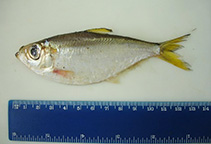| Family: |
Pristigasteridae (Pristigasterids) |
| Max. size: |
18 cm TL (male/unsexed); max.weight: 33.0 g |
| Environment: |
pelagic-neritic; brackish; marine; depth range 5 - 36 m |
| Distribution: |
Western Atlantic: Panama, Trinidad, and the Guianas southward to southern Brazil. |
| Diagnosis: |
Dorsal spines (total): 0-0; Dorsal soft rays (total): 0; Anal spines: 0-0; Anal soft rays: 36-42. Belly with 17 to 20 + 5 to 7, total 22 to 26 scutes. Eye large, lower jaw projecting; upper jaw with a toothed hypo-maxillary bone between hind tip of pre-maxilla and lower bulge of maxilla blade. Pelvic fins with distinct axillary scale; anal fin long, its origin under middle of dorsal fin base. Scales easily lost (Ref. 188). Bluish gray above, sides silvery (Ref. 37032). |
| Biology: |
Found inshore, along beaches and down to at least 16 m over a muddy bottom. Enters estuaries, but perhaps not tolerating very low salinities (Ref. 12225). |
| IUCN Red List Status: |
Least Concern (LC); Date assessed: 05 March 2017 Ref. (130435)
|
| Threat to humans: |
harmless |
Source and more info: www.fishbase.org. For personal, classroom, and other internal use only. Not for publication.
